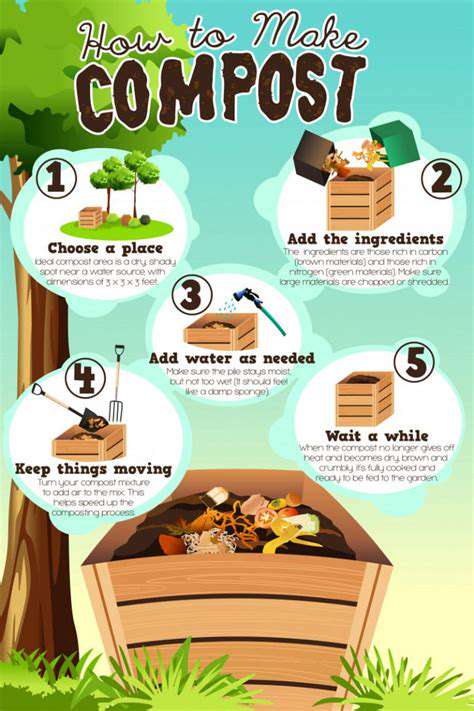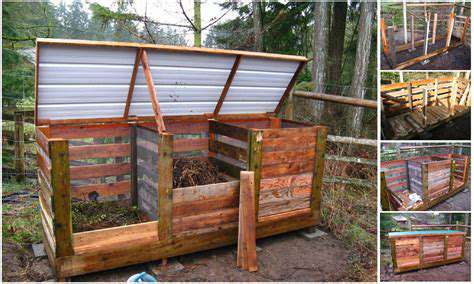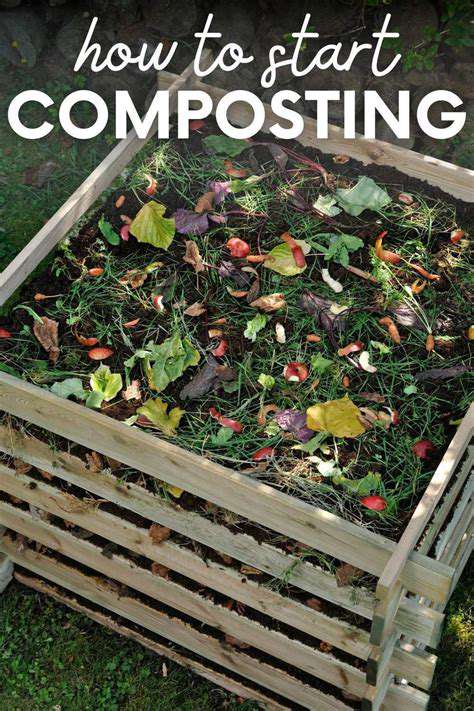Guide to Composting at Home

Turning Your Compost
Turning your compost is a crucial step in the composting process, as it aids in the decomposition of organic matter and ensures a more even distribution of moisture and air. This process is essential to prevent the formation of anaerobic conditions, which can lead to unpleasant odors and slow down the composting process. Proper turning also helps to break down large pieces of organic material into smaller, more manageable pieces, speeding up the decomposition process.
Consistent turning ensures that all parts of the compost pile are exposed to oxygen, which is vital for aerobic decomposition. Failing to turn your compost can result in a pile that is unevenly decomposed, potentially leading to the presence of unwanted materials like large pieces of food scraps or yard waste. This also directly impacts the quality and speed of the composting process.
Monitoring Your Compost
Monitoring your compost pile is vital to ensure that it is breaking down properly and that you are on track for a successful compost. This involves regularly checking the moisture content, temperature, and overall appearance of the compost pile. Observing these factors allows you to adjust your approach if necessary, ensuring a timely and effective composting process.
A crucial aspect of monitoring is noting the temperature of the compost pile. A healthy compost pile will typically reach a temperature of 130-160 degrees Fahrenheit. This high temperature is a sign that beneficial microorganisms are actively breaking down the organic matter. Keeping an eye on this temperature range provides a good indication of the composting process's health.
Choosing the Right Tools
Selecting appropriate tools for turning and monitoring your compost is crucial for efficient and effective composting. Investing in a sturdy pitchfork or compost turner can significantly simplify the process of turning the compost pile, ensuring that all materials are properly mixed. Using the right tools can also help prevent unnecessary strain and potential injuries during the composting process.
Using a thermometer to monitor the compost pile's temperature is highly recommended for optimal results. This helps you track the progress of decomposition and adjust your approach as needed. Proper tools ensure not only efficiency but also safety and comfort during composting tasks.
Understanding Ideal Compost Conditions
Understanding the ideal conditions for composting is essential for achieving a quality compost product. Maintaining a balanced moisture level is vital; it should be damp but not soggy. A pile that is too dry will inhibit decomposition, while a pile that is overly wet can lead to anaerobic conditions.
Aerobic decomposition, achieved by proper turning, is crucial for creating a high-quality compost. This process relies on oxygen for the microorganisms to break down organic matter effectively. Maintaining the right moisture content ensures that the compost pile stays in the optimal range for decomposition and avoids unpleasant odors.
Compost Pile Structure
The structure of your compost pile significantly impacts its performance. Layering different types of organic materials, such as green and brown materials, is crucial for creating a balanced mix. This layering is key for achieving optimal airflow and moisture retention within the pile.
A well-structured compost pile allows for better decomposition and prevents the build-up of unwanted materials. Proper layering also aids in the even distribution of heat and moisture, further contributing to a faster and more effective composting process. By maintaining a consistent structure, you ensure that your compost pile functions optimally.
Frequency of Turning and Monitoring
The frequency of turning and monitoring your compost pile depends on several factors, including the size of the pile, the type of materials used, and the desired speed of decomposition. Generally, a smaller pile might need to be turned more frequently than a larger one.
Regular turning and monitoring are key to maintaining a healthy and productive compost pile. This allows for consistent observation of decomposition progress and helps to identify any potential issues early on. The frequency of these tasks should be adjusted based on the specific needs of your compost pile and the materials being used.
Using Your Homemade Compost: Nurturing Your Garden

Compost as a Soil Amendment
Compost, a rich, dark material created by the decomposition of organic matter, is an excellent soil amendment. It significantly improves soil structure by increasing its porosity and water retention capacity. This, in turn, leads to better drainage and aeration, essential for healthy root development in plants.
Adding compost to your garden soil enhances its overall fertility, providing essential nutrients for plant growth. The gradual release of nutrients from the compost nourishes plants throughout the growing season, reducing the need for frequent chemical fertilizers. This is a sustainable and environmentally friendly approach to gardening.
Boosting Plant Health and Growth
The addition of homemade compost to your garden beds offers a wide range of benefits for plant health. Compost acts as a natural soil conditioner, improving drainage and aeration, creating a favorable environment for root growth and nutrient uptake. This contributes to stronger, healthier plants that are more resilient to pests and diseases.
By providing a balanced nutrient profile, compost supports robust plant growth and development. This leads to more abundant blooms and larger harvests, depending on the type of plant you're growing. It's a significant advantage for vegetable gardens, flowerbeds, and even landscaping projects.
Enhancing Soil Structure and Water Retention
Compost's ability to improve soil structure is a key benefit for your garden. It helps create a more stable and porous soil structure, allowing for better water infiltration and drainage. This prevents waterlogging and ensures that the soil retains moisture effectively, reducing the frequency of watering.
Improved water retention is crucial for plant health, especially during dry spells. Compost acts as a natural sponge, holding onto water and releasing it gradually to the roots. This crucial support ensures consistent hydration, mitigating stress on plants during periods of drought.
Environmental Benefits of Using Compost
Employing homemade compost in your gardening practices has significant environmental advantages. It reduces the need for synthetic fertilizers, which can have detrimental effects on water quality and ecosystems. Using compost is a way to minimize your carbon footprint.
By diverting organic waste from landfills, you contribute to a more sustainable and environmentally friendly approach to gardening. Composting also helps reduce greenhouse gas emissions, aligning with broader environmental goals.






![How to Learn a New Language Fast [Proven Methods]](/static/images/31/2025-05/FocusonCommunication3APracticeMakesPerfect.jpg)





![Best Smart Light Bulbs [Review]](/static/images/31/2025-05/KeyFeaturestoConsiderWhenChoosingSmartBulbs.jpg)